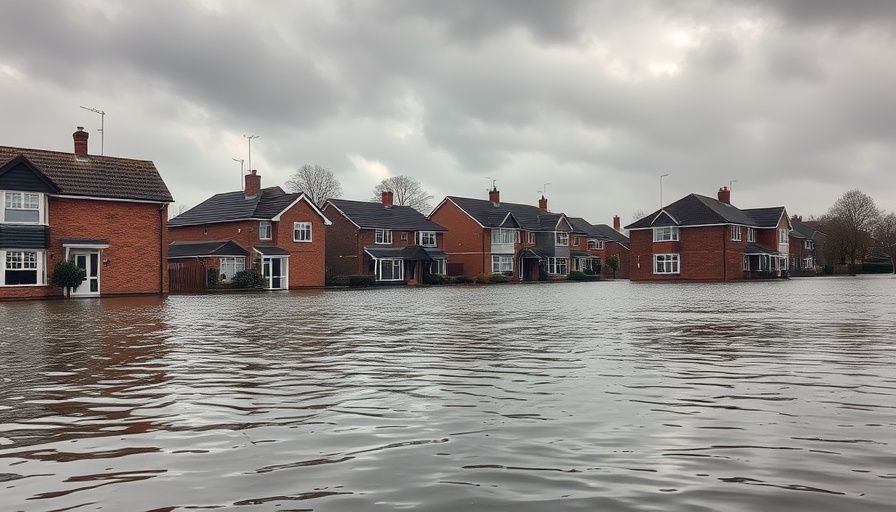
FEMA's Cuts: A Shocking Blow to Flood-Prone Communities
Amid a backdrop of intense storms and climate change, FEMA's cancellation of the Building Resilient Infrastructure and Communities (BRIC) grant program has left many communities in shock and disbelief. One particularly poignant example can be found in Central, Louisiana, where Mayor Wade Evans has faced the brunt of these cuts personally. Evans, a lifelong resident and a supporter of Donald Trump, expressed frustration over losing nearly $40 million designated for vital flood control infrastructure. His assertions, bolstered by local experience, indicate that the elimination of this funding could lead to higher future costs as communities repeatedly face the financial burdens of disaster recovery.
The Politics of Natural Disasters: Are Politics Overruled by Nature?
Evans’s comments underscore a broader narrative—natural disasters do not follow party lines. The reality is that over two-thirds of the counties set to receive BRIC funds strongly supported Trump during the last election. This situation raises questions about whether political agendas are overshadowing critical disaster preparedness efforts that could have protected these communities from the spate of heavy and worsening storms. Under Secretary Noem's assertion that BRIC is 'wasteful and ineffective' fails to recognize the potential benefits such infrastructure investments could deliver, particularly in the context of a changing climate that increasingly puts many communities at risk.
The Ripple Effect of Losing Infrastructure Funds
The direct impacts of this funding cancellation can already be seen across the Southeast and beyond. In North Carolina, flooding risks loom large as several grants slated for communities battered by Hurricane Helene were canceled, stalling projects that could significantly enhance safety and resilience. About 18 counties in Florida, which are projected to receive nearly $250 million, face similar hardships. With communities left scrambling for financial alternatives, the question arises: what will be the long-term economic impacts of these infrastructure deficiencies?
Mitigating the Damage: Community Responses to Uncertainty
In response to these cancellations, many local leaders, including Louisiana's senior senator Bill Cassidy, have publicly decried the cuts. Cassidy pointed out the contradiction in the federal government taking away funds meant to support infrastructure that would save money for taxpayers in the long run. Local politicians are now weighing their options, looking for alternative funding channels while pushing back against the federal decisions that could leave their communities vulnerable.
Grants That Could Have Changed Lives
The BRIC program, which provided vital funding for infrastructure improvements, is more than just a set of numbers in a budget; it represents real hope for communities like Central, Pollocksville, and others. Grants under BRIC were designed for projects that protect against disasters, like elevating buildings or reinforcing flood control systems, directly addressing urgent community needs. However, with reduced funding, many of these initiatives will remain unrealized, increasing vulnerability to future climatic events.
Future Predictions: What Lies Ahead for Resilient Communities?
As we navigate this turbulent climate landscape, the chances of facing increasingly severe storms and weather events grows. Experts predict that without adequate investment in infrastructure, we will see more communities suffer from flood damage, setting off a cycle of disaster recovery that remains financially unsustainable. The lack of foresight in cutting these programs calls into question the commitment to equity amid climate change—will all Americans truly make it through these crises together?
Conclusion: A Call for Collective Action
This unfolding situation illustrates the urgent need for communities, regardless of political affiliations, to band together and advocate for disaster preparedness funding. Political rhetoric must yield to actions that ensure safety and resilience in civil society. The stories emerging from the communities most affected by FEMA’s cuts remind us that we are all part of this shared experience of the challenges posed by climate change.
As we look ahead, it is crucial that we stay informed and engaged with local issues, advocating for the funding and policies necessary to protect vulnerable communities. If you feel strongly about infrastructure development in your area, consider reaching out to your local representatives to express your thoughts.
 Add Element
Add Element  Add Row
Add Row 



Write A Comment